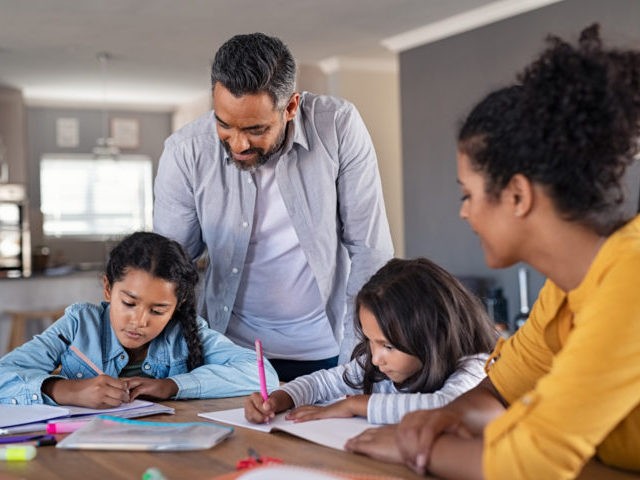A new study published at the Boston-based Pioneer Institute points to the significant increase in families who are now regularly homeschooling as a sign the education option is now a “viable” choice.
The study notes that, while parents across the nation were suddenly plunged into the realm of having “school at home” when the pandemic hit in March 2020, many decided the closer involvement they experienced in their children’s education would be the best permanent option after all.
Kerry McDonald, senior education fellow at the Foundation for Economic Education, writes in the study’s foreword:
The COVID-19 pandemic has re-empowered parents in unprecedented ways, putting them back in the driver’s seat of determining the best learning environment for their children. As entrepreneurs recognize the mounting demand for schooling alternatives and invent new educational solutions, more families will be able to join current homeschoolers in opting out of an assigned district school for other, better options.
The U.S. Census Bureau reported in late March that 11.1 percent of K-12 students in the nation are now homeschooling, a significant jump from 5.4 percent when school closures went into effect in spring of 2020, and from the 3.3 percent of families who homeschooled prior to the coronavirus pandemic.
“Policymakers should support both parents and entrepreneurs as they seek and create high-quality, personalized education approaches that nurture learning outside of a conventional classroom,” McDonald advises.
The study’s authors, William Heuer, a member of the board of directors of the Massachusetts Home Learning Association, and journalist William Donovan, interviewed families who have chosen traditional homeschooling – not simply the type of remote learning conducted by school districts when the buildings were closed.
The authors take special note of the rise in homeschooling among black and other minority families:
While they too were influenced by health concerns, often they choose to homeschool because they believe their homes are a safer environment than the halls and grounds of public schools, especially in urban areas. Safety is among the reasons given by so-called “second choice” homeschoolers who switch to homeschooling for pragmatic reasons and not a traditional reason such as religious fundamentalism.
The Census Bureau data showed homeschooling rates are surging among black families, in which the proportion homeschooling increased from 3.3 percent in spring 2020 to 16.1 percent in fall 2020.
Heuer and Donovan include in their paper the criticism of Harvard Law School Professor Elizabeth Bartholet, who assailed the practice of homeschooling in an Arizona Law Review article titled, “Homeschooling: Parent Rights Absolutism vs. Child Rights to Education & Protection.”
Arguing that unregulated homeschooling is endangering both children and society, Bartholet has advocated for a “presumptive ban” on the education practice.
“Parents can now keep their children at home in the name of homeschooling free from any real scrutiny as to whether or how they are educating their children,” she wrote.
“Many homeschool because they want to isolate their children from ideas and values central to our democracy, determined to keep their children from exposure to views that might enable autonomous choice about their future lives,” she continued. “Many promote racial segregation and female subservience. Many question science. Abusive parents can keep their children at home free from the risk that teachers will report them to child protection services. Some homeschool precisely for this reason.”
Despite some critics, Heuer and Donovan note “the steady trend upward in families turning to homeschooling is undeniable.”
Even with the disruption of COVID and the initial unexpected situation of parents and children spending most of their work and school days under the same roof, the authors find the silver lining: the evaluation of traditional school systems:
Little did we know that in the midst of this technological process, the real disruption in education would be instigated by COVID. While the devastating effects of the COVID pandemic will have generational ramifications, on the educational front school closures had a major impact on how parents and families viewed the traditional school systems. Just about everyone experienced an educational aspect formerly associated with those who were traditionally homeschooled. Whether that be more interaction between child and parent in a learning environment, online learning, self-directed initiatives, increased social time with siblings, independent project work, or just more personal time to pursue individual curiosity, it quickly became apparent that there are viable alternatives to traditional public schools and that millions were intrigued with those possibilities.
The authors conclude with the recommendation that homeschooling be acknowledged as “a viable educational choice,” one that, they say, should be supported by school districts.
Finally, Heuer and Donovan call for an end to the “socialization” myth.
They point to a perspective that links “schooling” with “socialization,” and the mindset that children cannot be “socialized” unless they attend a traditional school.
“[T]here is a misconception that has been engendered over the years that schools are the source of filling the social needs of our students,” the authors write. “Traditional homeschoolers would strongly disagree. It is unfortunate that COVID isolation has contributed to perpetuating this myth.”

COMMENTS
Please let us know if you're having issues with commenting.